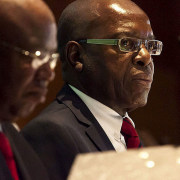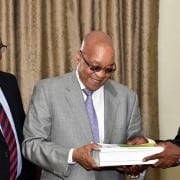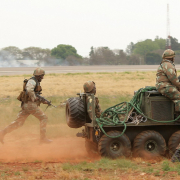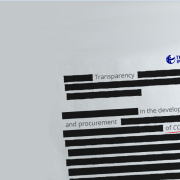|
Getting your Trinity Audio player ready...
|
 With the first round of Arms Deal Commission hearings just around the corner, the release of Transparency International’s (TI) inaugural government defence-corruption index couldn’t be more topical.
With the first round of Arms Deal Commission hearings just around the corner, the release of Transparency International’s (TI) inaugural government defence-corruption index couldn’t be more topical.
According to the results South Africa scores a D+ and is labelled a “high risk” nation in terms of the susceptibility of our government to corruption in the defence sector.
The index, compiled by TI’s Defence and Security Programme, surveyed 82 countries. Researchers from the programme considered a range of institutions in each country, including the defence and security ministries, armed forces and any other government institutions that could influence levels of corruption risk in the sector.
Each country assessment was peer reviewed twice and governments were invited to review the drafts. The research was finalised in January 2012.
Joining South Africa in band D+ are Israel, Kuwait and Lebanon. Australia and Germany’s government defence sectors are least at risk in band A, while the DRC, Libya and Syria are at the opposite end, in band F.
The TI index looks at five key areas of risk: political, finance, personnel, operations and procurement. South Africa doesn’t do too badly in personnel (52%) and finance (55%), but the other three areas are cause for concern.
In relation to political corruption risk, where South Africa scores 47%, reforms introduced since 1994 have helped to reduce vulnerability, according to TI.
An example of this is introducing a more open process of developing national defence policy, but reforms have not been extended to all areas.
Progress has been made in ensuring that parliament is more transparent and accessible, which in turn has allowed more effective scrutiny of defence policy, but senior positions within the intelligence service are, on occasion, filled according to personal loyalties rather than merit.
“In addition, there is a lack of control over arms export controls, with claims that numerous arms transactions have occurred without the legally required input from relevant government departments,” TI states in the results for the South African study.
In the area of personnel corruption risk, the appointment of a commission to investigate the infamous 1999 Arms Deal has not yet been accompanied by sufficient practical or transparent measures to prevent instances of corruption, the study reveals.
“The resources needed to effectively carry out corruption risk assessments are not in place and while legislation to protect whistleblowers does exist, its impact is offset by the reality that whistleblowers are perceived as disloyal,” according to TI.
In operations corruption risk there is no known training for commanders to ensure they are clear on the corruption issues they may face during deployment. Also, while the South African National Defence Force has carried out operations to address corruption on our borders, there is no evidence of trained staff being tasked to monitor corruption risk.
When TI looked at procurement corruption risk it found that legislation to safeguard against this does exist, but it’s not supported by adequate resources or the required political will for it to be effective.
“For example, while legislation is in place to allow companies to complain about malpractice in procurement, evidence suggests that when companies do complain to the relevant mechanisms, this does not lead to the desired outcomes.
“While national laws such as the Prevention and Combating of Corrupt Activities Act do broadly cover activities such as collusion, enforcement is weak and there is no specific legislation for defence contracts.”
How the index came about
“This index came about because many people—defence leaders, defence officials and members of civil society—repeatedly asked us: ‘how can we measure our progress in combating corruption in this sector?’” TI says.
“This index assesses and compares levels of corruption risk and vulnerability across countries to increase understanding of the problem and encourage reform. The methodology ensures that we can compare results over time and between countries to monitor progress and encourage change.”
Researchers assessed each government individually, using a questionnaire of 77 questions based on TI’s defence corruption risks typology. The study will be repeated every two years.









